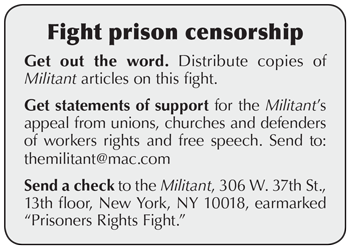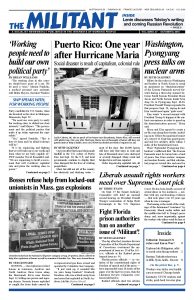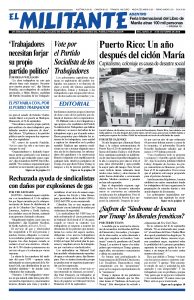The day after the Literature Review Committee of the Florida Department of Corrections overturned the impoundment of issue no. 29 of the Militant, officials at the Raiford prison banned issue no. 34.
Florida prison officials — in violation of the constitutional rights of freedom of speech and of the press — have impounded some 18 issues of the paper over the last two years, then the Literature Review Committee overturned all but five.
Raiford officials cited two articles to justify the impoundment of no. 34: “California Protest Demands ‘End Solitary Confinement!’” and “Free Ukraine Director on Hunger Strike from Siberia Jail!” They falsely assert the articles describe or encourage “activities which may lead to the use of physical violence or group disruption” and that they are “dangerously inflammatory” and advocate or encourage “riot, insurrection, disruption of the institution, violation of department or institution rules.”
The Militant, like other newspapers across the country — including the New York Times, Miami Herald, Los Angeles Times and many others — has run articles highlighting opposition to solitary confinement. The Militant prominently covered the dramatic hunger strike that united thousands of California inmates seeking an end to that barbaric system. They were successful, and U.S. courts ordered the California Department of Corrections to end it in virtually all cases in 2015.
In fact, the article used to impound the issue was a report on a court-ordered meeting between prisoners who led that strike and prison authorities to address areas where the prisons had attempted to evade the court decision. Issues that reported on that hunger strike were either not banned or impoundments of them were overturned.
Previous issues of the Militant have also reported on the hunger strike by Oleg Sentsov, a Ukrainian film director imprisoned by the Vladimir Putin regime in Russia, without the paper being impounded. Sentsov has the support of hundreds of movie directors, actors, screenwriters, artists and others worldwide.
 Over the past several years the Militant has received support for its fight against censorship from a wide range of groups and individuals, including the Florida Civil Liberties Union, the National Lawyers Guild, Amnesty International USA, PEN America, the Reporters Committee for Freedom of the Press, the Riverside Church Prison Ministry, the American Friends Service Committee, Justice League NYC, Heather Ann Thompson, author of Blood in the Water, and many more.
Over the past several years the Militant has received support for its fight against censorship from a wide range of groups and individuals, including the Florida Civil Liberties Union, the National Lawyers Guild, Amnesty International USA, PEN America, the Reporters Committee for Freedom of the Press, the Riverside Church Prison Ministry, the American Friends Service Committee, Justice League NYC, Heather Ann Thompson, author of Blood in the Water, and many more.
Individual subscribers of the Militant have also written letters protesting these flagrant violations of the Bill of Rights.
‘End impoundments of Militant’
Kim O’Brien, a subscriber to the Militant in the Boston area, also wrote. “I have never read where the Militant has ever encouraged the use of violence against its political opponents,” O’Brien noted. “In fact, the Militant has condemned the use of disruption tactics in Senate hearings on Supreme Court nominee Brett Kavanaugh and threats made against Trump administration officials eating in restaurants.”
“I ask that you end the impoundment of current issues of the Militant and all future issues.”
Dean Peterson, chair of the committee, responded to O’Brien. “By rule decisions must be made on an issue by issue basis,” he said, noting that of the hundreds of issues of the paper published since January 2012, “only five have been rejected by our Literature Review Committee.”
But Peterson’s response ignores the time and money the Militant and its attorney are forced to expend in responding to the ongoing series of arbitrary and capricious impoundments. The fact that so many have been overturned just underscores this fact. The Literature Review Committee has never given an explanation as to why it has upheld the ban on any issue of the paper.
Militant attorney David Goldstein, of the Rabinowitz, Boudin, Standard, Krinsky and Lieberman law firm, wrote the committee to say the impoundment of issue no. 34 will be appealed.
“Charges that the Militant poses a threat of violence or is disrupting the prison institution have no basis in fact,” said Militant editor John Studer. “All of the bans have been a violation of the constitutional rights of both our subscribers behind bars and our paper.”
Studer noted that prison authorities around the country have attempted to limit prisoners’ access to books, periodicals and letters, including new rules being implemented in Pennsylvania. “Our fight against censorship of the Militant strengthens the fight against all these unconstitutional restrictions,” he said.
“Letters and statements to the prison authorities have an impact,” Studer said. “We ask you to get letters from unions, church groups, community groups and other defenders of democratic and political rights. The fight for the rights of workers behind bars is a fight for all our rights.”
Send letters to Dean Peterson, Library Services Administrator, Florida Department of Corrections, Att: Literature Review Committee, 501 South Calhoun Street, Tallahassee, FL 32399-2500, via email to Allen.Peterson@fdc.myflorida.com, or via fax at (850) 922-2121. Please send a copy and a contribution to continue this battle to the Militant.

